Welcome New Member – Columbia County Historical and Genealogical Society
 The Chamber is pleased to welcome The Columbia County Historical and Genealogical Society (CCHGS) as one of its newest members.
The Chamber is pleased to welcome The Columbia County Historical and Genealogical Society (CCHGS) as one of its newest members.
The CCHGS is committed to the collection, preservation, and publication of the history of Columbia County and to develop resources to aid individuals to discover their family history. It is a charitable and educational organization run entirely by loyal volunteers who collect and index important documents such as church records, cemetery listings, genealogies, manuscripts, photos, pamphlets, clippings, and many others, along with maintaining the Society’s museum and library. Located on the second floor of the Bloomsburg Public Library, it has a library and limited museum collection that is open to the public.
Annually, the Society sponsors public programs, genealogy workshops, and tours to places of historical interest. It also publishes a Newsletter four times a year consisting of multiple pages. Members are entitled to discounts for trips, purchases, and special programs that have a fee. For more about the CCGHS, visit https://colcohist-gensoc.org/
We’re Taking #LaborDayOn
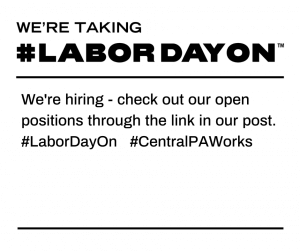
For unemployed Americans, this Labor Day won't be a day off, so we're taking #LaborDayOn.
Created by Red Wing Shoes in 2021, the #LaborDayOn campaign is a rallying cry for businesses to post their jobs for all to see. This year, thanks to community partners at DRIVE, the CareerLink and others, the Chamber and its Foundation are excited to join the campaign with a a focus on Central Pennsylvania.
Join Us For the Campaign September 5 - 9, 2022
From September 5 through September 9, the Chamber and its Foundation are asking businesses big and small to join us in posting any job openings that they have using the hashtags #LaborDayOn, #CentralPAWorks and tagging the Chamber and Foundation social media pages in the posts. When you post, the Foundation's social media platforms will share it. When Chamber members post to Facebook and LinkedIn, these posts will also be shared by the Chamber's social media. Additionally, the Chamber will be highlighting businesses who have submitted job postings to the Chamber website, found here.
Use the Toolkit
Our partners in this effort, DRIVE, created a uniform toolkit for businesses to use, including the image files for posts and an FAQ document. Please feel free to download these resources here.
Together, our hope is to reclaim the true meaning of Labor Day and help talented, Central Pennsylvanians and local businesses find the thing they need most: each other.
Columbia and Montour Counties Fall Under Drought Watch
Source: Pennsylvania Pressroom
Ways to Conserve Water at Home
How DEP Determines Drought Conditions
Nonprofits: Improve Your Year-End Reporting
by on
 We are over halfway through 2022! Many people are looking around and asking, “Where did the year go?” As summer comes to a close, many nonprofit organizations are preparing to start their year-end closing process. Even though it signifies the completion of one fiscal year into another, the process is often dauting to begin, as it includes the completion of several different procedures and the approval of management and/or the board. Below are some suggestions of internal control improvements that an organization can implement to help make the year-end closing process run more efficiently.
We are over halfway through 2022! Many people are looking around and asking, “Where did the year go?” As summer comes to a close, many nonprofit organizations are preparing to start their year-end closing process. Even though it signifies the completion of one fiscal year into another, the process is often dauting to begin, as it includes the completion of several different procedures and the approval of management and/or the board. Below are some suggestions of internal control improvements that an organization can implement to help make the year-end closing process run more efficiently.
Review Donor Restrictions Annually
Donor contributions with restrictions are contributions with donor-imposed restrictions. These restrictions can expire either by the passage of time or by the fulfillment of the stated restriction in the donor letter. Prior to recording the year-end total donor contributions with restrictions, each of these contributions should be reviewed to determine if the restrictions noted by the donor have been met.
Reconcile Donor Records to Accounting Records
Prior to recording the total year-end contributions, a reconciliation between the donation records (donor database) and the accounting records should be prepared. Once prepared, the reconciliation should be included in the year-end financial statement packet to be reviewed and approved by management prior to being presented to the board.
Review Monthly Bank Statements
During the year end reporting process, management should ensure that all bank statements and reconciliations for the fiscal year have been reviewed and approved. For control purposes, the review of the statements and reconciliations should be completed by someone other than the bookkeeper or person responsible for recording the monthly accounting transactions. This review should also include investment statements and any debt/line of credit accounts.
Review Monthly Financial Statement
Internal financial statements should be reviewed by the executive director and/or the board of directors prior to approval. In addition to the balance sheet and the profit and loss statement as of year-end, the internal financial statements can include a comparison of actual revenue and expense recorded to the approved budget, a breakout of any non-operating transactions which were considered outside of the organization’s control and a projection of cash flow/cash needs for the next fiscal year.
Create a Month-End and Year-End Closing Checklist
To ensure all necessary year-end processes and reviews have been completed, a year-end checklist should be created and filled out by management. The checklist should include all necessary year-end procedures such as recording final journal entries, account reconciliations, and preparation of internal financials. These should be initialed by the preparer and the reviewer at each step, and then reviewed by the executive director or the board.
For additional steps that can be implemented during the year to improve internal controls, see McKonley and Asbury's previously published article. You can also learn more about our Nonprofit services by visiting our website.
Member News – August 31, 2022
Doug McMinn to Play at The Listening Room Tonight
The Exchange invites you to join Doug, a leader and a sideman, who has had a long career playing with dozens of local bands. Donations at the door, BYOB is allowed.
Commonwealth University Announces Fall 2022 Career Expos
Meet students and potential hires from Bloomsburg, Lock Haven and Mansfield who are interested in careers in the Accounting, Financial Services and Banking industries. The Accounting and Financial Services Expo will take place September 19 - 22. The Logistics, Information Technology, and Management Expo will take place September 26 - 29. Join the 42 employers registered to attend!
Geisinger Health Plan Receives J.D. Power Award
Geisinger Health Plan was ranked the best health plan in Pennsylvania in the J.D. Power 2022 U.S. Commercial Member Health Plan Study* of customers’ satisfaction with their commercial health plan. Read more.
MARC Announces Staffing Changes
On August 22, Montour Area Recreation Commission approved three staffing changes. These changes included:

- Jon Beam – reclassified from Assistant Director / Naturalist to Naturalist
- Julian Brehm – reclassified from Intern to Assistant Director
- Valentina Shevchenko – reclassified from Intern to Park and Trail Maintenance Technician
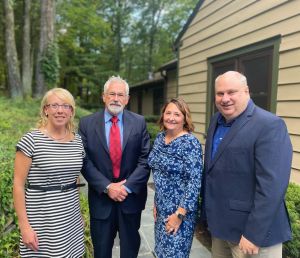
SEDA-COG Honors Staff with 30 Years of Service
Congratulations to Kristen Moyer, Jeff Stover and (not pictured), Timothy Shawver for their dedicated work.
Bloomsburg Theatre Ensemble Hosting Auditions for 'A Christmas Carol'
On Saturday, September 3, members of the public are invited to try out for the classic Charles Dickens play. Read more.
Columbia County Traveling Library to Host Mother Goose on the Loose Storytime
This Early Literacy Program aids in speech development, motor coordination, and a love of books for ages birth - two years old. Program is a six week series beginning September 6. Register here.
Knoebels Announces 2022 Scholarship Recipients
Ten Knoebels Amusement Resort team members are starting off the 2022-23 school year with an extra $750 in their pockets from the park’s scholarship program. Read more.
Iron Heritage Festival Just Around the Corner
Mark your calendars for September 9 - 11 for this community celebration, held in conjunction with the Fall Arts & Crafts Festival. This year’s festival will center on Mill Street, but includes special events at other locations throughout the Danville community, such as living history presentations, historic tours of Danville, train rides, live music, vendors, great food, fireworks, hikes, 5K run/walk and much more. Don't miss the train excursions, brought to you by The Danville Business Alliance, Danville Centennial Lions Club, Danville Heritage Festival, North Shore Railroad & Penn Valley Railroad, in partnership with the SEDA-COG Joint Rail Authority. Read more.
Want To Go Fishing?
 Did you know that the Columbia County Conservation District partners with the Pennsylvania Fish and Boat Commission to loan out fishing rods and tackle to individuals/groups? The Fishing Tackle Loaner Program, (FTLP) assists people who are interested in fishing but may not have equipment of their own, or want to try out to the hobby before purchasing equipment. When you loan from the District, you will receive fishing poles, a tackle box with hooks, sinkers, bobbers, and basic artificial lures, all you need is live bait and a fishing license! The program also provides participants with a list of popular fishing spots and bait stores throughout Columbia County so that you will be ready to start reeling them in as soon as you pick up the equipment! Read more.
Did you know that the Columbia County Conservation District partners with the Pennsylvania Fish and Boat Commission to loan out fishing rods and tackle to individuals/groups? The Fishing Tackle Loaner Program, (FTLP) assists people who are interested in fishing but may not have equipment of their own, or want to try out to the hobby before purchasing equipment. When you loan from the District, you will receive fishing poles, a tackle box with hooks, sinkers, bobbers, and basic artificial lures, all you need is live bait and a fishing license! The program also provides participants with a list of popular fishing spots and bait stores throughout Columbia County so that you will be ready to start reeling them in as soon as you pick up the equipment! Read more.Hat's Off to Camp Victory Volunteers
 Congratulations are in order to Gail and the volunteers in her kitchen crew at Camp Victory, as they fed more than 150 bikers a chicken barbecue lunch as part of a fundraising event at Camp Victory on August 28. Wow!
Congratulations are in order to Gail and the volunteers in her kitchen crew at Camp Victory, as they fed more than 150 bikers a chicken barbecue lunch as part of a fundraising event at Camp Victory on August 28. Wow!
Community Giving Foundation: Berwick, Bloomsburg and Danville Announce Scholarships
Foundation scholarship funds awarded over $414,000 in scholarships to more than 285 high school seniors and current undergraduate students in 2022.
 Read the announcement from Berwick.
Read the announcement from Berwick.
Read the announcement from Danville.
Read the announcement from Bloomsburg.
Columbia County Christian School Building Project Progresses
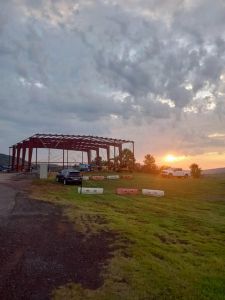 Columbia County Christian School is celebrating progress on their new Arts & Athletic Center. "Concrete is down, the beams are up, and the sunrise/sunset photos behind the project are beautiful!" You can follow the progress on the new facility on their Facebook page.
Columbia County Christian School is celebrating progress on their new Arts & Athletic Center. "Concrete is down, the beams are up, and the sunrise/sunset photos behind the project are beautiful!" You can follow the progress on the new facility on their Facebook page.
Spending Reductions Critical to Curbing Inflation
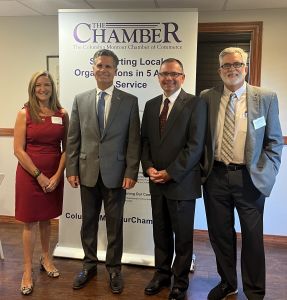 While critical of the spending levels in several recent packages passed in Washington, Congressman Dan Meuser believes there are solutions to strengthen the U.S. economy and begin to reduce debt. Meuser (PA-9) discussed the factors contributing to inflation in a breakfast meeting with members of the Columbia Montour Chamber of Commerce on Thursday, August 25th. The program was sponsored by PPL Electric Utilities and hosted by Craft Catering.
While critical of the spending levels in several recent packages passed in Washington, Congressman Dan Meuser believes there are solutions to strengthen the U.S. economy and begin to reduce debt. Meuser (PA-9) discussed the factors contributing to inflation in a breakfast meeting with members of the Columbia Montour Chamber of Commerce on Thursday, August 25th. The program was sponsored by PPL Electric Utilities and hosted by Craft Catering. 
In an update that included the Congressman’s committee service and recent legislation, Meuser shared that as a member of the Problem Solvers Caucus, he worked with colleagues from both parties to advance the transportation infrastructure package that was passed in late 2021, as well as the CHIPS Act, designed to boost the domestic production of microprocessors. The Congressman was not in favor of the final versions of either bill, due to billions of dollars in spending added to both. While he supported large spending packages during the early days of the COVID pandemic to support employers, the medical industry, and displaced workers, Meuser believes reductions in spending are necessary to curb inflation.
Meuser stressed his vocal opposition to the recently passed Inflation Reduction Act, which he argues will have the opposite effect on inflation - increasing taxes on energy and implementing a minimum tax on corporations. The bill also doubles the number of IRS agents by 87,000, a staffing increase that, according to the Congressman, will not generate the additional projected revenue due to the urgent need of the agency to update its processes and quality of information. While the legislation stipulates that businesses and individuals earning less than $400,000 will not be audited, 91% of current audits are conducted on those earning less than $400,000, according to Meuser.
Switching from domestic spending to foreign affairs, Meuser believes that, despite an over-reliance on goods produced in China, our significant trade relationship will help avoid an invasion of Taiwan. Stressing the importance for the U.S. to be more competitive globally, he noted that the 21% corporate tax rate is “in the middle of the pack”. From a domestic security perspective, he also discussed the need to revisit polices related to Afghanistan and southern border security, sharing insights he’s received from military and border patrol personnel. 
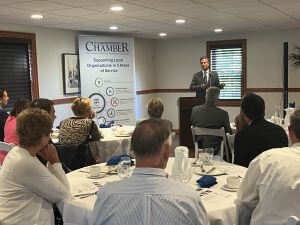
As the 9th Congressional District is set to expand geographically as a result of redistricting, guests at the event expressed gratitude for the Congressman’s engagement with the Chamber. Concluding the event, Chamber President Fred Gaffney informed participants that the Consumer Financial Protection Bureau may be revising “employer-driven debt” policies that could make hiring employees more challenging. Employers have until September 7th to provide comments.
###
Webinar: Pennsylvania Restaurant Lodging Association to Host PA Minimum Wage Act Updates
On Wednesday, September 7, 2022 from 11:00am to noon, the Pennsylvania Restaurant and Lodging Association will host experts from the Pennsylvania Department of Labor & Industry for a webinar on the updated Minimum Wage Act regulations that went into effect on August 5.
Employers and other stakeholders with questions about the updated regulations are encouraged to participate in this webinar session. Bureau of Labor Law Compliance Director Bryan Smolock will review the updates and answer any questions. Send in your specific questions in advance by emailing advocacy@prla.org.
Approved by the Independent Regulatory Review Commission and Attorney General Josh Shapiro earlier this year, the final-form regulation updates how employers pay tipped workers and ensure that salaried employees with fluctuating schedules are appropriately compensated for overtime. Register for this free webinar.
Chamber Leadership Program Expands to Provide Opportunities Throughout the Year
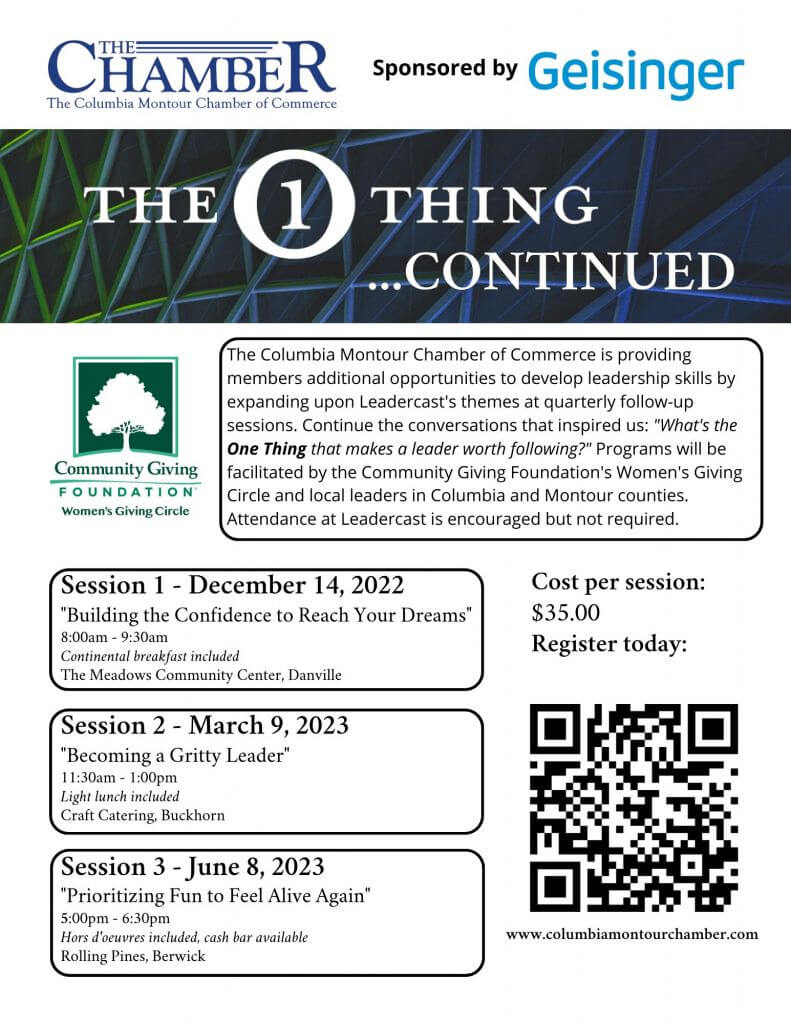 As The Columbia Montour Chamber prepares to host its annual “Leadercast Women” event, we are pleased to announce an expansion of the programming to help employees develop leadership skills throughout the year. This expansion is made possible through the sponsorship of Geisinger and the involvement of the Community Giving Foundation’s Women’s Giving Circle.
As The Columbia Montour Chamber prepares to host its annual “Leadercast Women” event, we are pleased to announce an expansion of the programming to help employees develop leadership skills throughout the year. This expansion is made possible through the sponsorship of Geisinger and the involvement of the Community Giving Foundation’s Women’s Giving Circle.
The Chamber’s “Leadercast Women” program launches on September 8 at the Pine Barn Inn and will feature presentations by Angela Duckworth, Author and Founder of Character Lab, Sukhinder Singh Cassidy, Founder of theBoardlist, Former President of StubHub, Catherine Price, Science Journalist, Teacher, Consultant and Best-Selling Author, and Diana Trujillo, Aerospace Engineer at the NASA Jet Propulsion Lab. These speakers will address the question, “What is the one thing that makes a leader worth following?” Members of the Women’s Giving Circle will facilitate conversations with attendees following each speaker to reinforce and build upon the specific themes.
The September 8, half-day program will be supplemented by quarterly events which will expand upon the “One Thing” theme, including “Building the Confidence to Reach Your Dreams” (December 14, 2022), “Becoming a Gritty Leader” (March 9, 2023), and “Prioritizing Fun to Feel Alive Again” (June 8, 2023). These quarterly events will be held at locations across the Chamber’s footprint; The Meadows Community Center in Danville, Craft Catering in Buckhorn, and Rolling Pines in Berwick. While the series is thematic, each event is independent. Participation in the September 8 event is recommended but not required.
To learn more or to sign up for these events (and others like them), visit our Calendar of Events.
Becker Healthcare Podcast Interviews Geisinger Doctors Martin, Suk

The Becker Healthcare Podcast, associated with Becker's Hospital Review, is recognized as a forum for healthcare industry thought leadership. Recently, this podcast featured not one, but two Geisinger physicians. Congratulations to Dr. Suk and Dr. Martin for recognition in making local healthcare in Columbia and Montour Counties cutting-edge. Check out these podcasts here:
 On August 15, Dr. Michael Suk, Chair of Musculoskeletal Institute & Department of Orthopaedic Surgery at Geisinger Health System, sat down with the Scott Becker of Becker Healthcare Podcast,discusses his experience as a White House Fellow under GeorgeW. Bush, orthopedic virtual centered care, the importance of being a lifelong learner, and more. Check out Dr. Suk's interview here.
On August 15, Dr. Michael Suk, Chair of Musculoskeletal Institute & Department of Orthopaedic Surgery at Geisinger Health System, sat down with the Scott Becker of Becker Healthcare Podcast,discusses his experience as a White House Fellow under GeorgeW. Bush, orthopedic virtual centered care, the importance of being a lifelong learner, and more. Check out Dr. Suk's interview here.
 On August 20, Dr. Christa Martin, Chief Scientific Officer and Vice Dean for Research at Geisinger, joined the Becker Healthcare Podcast to talk about innovation and future growth. Check out Dr. Martin's interview here.
On August 20, Dr. Christa Martin, Chief Scientific Officer and Vice Dean for Research at Geisinger, joined the Becker Healthcare Podcast to talk about innovation and future growth. Check out Dr. Martin's interview here.
WELCOME NEW MEMBER – NORTHEAST INSPECTION CONSULTANTS

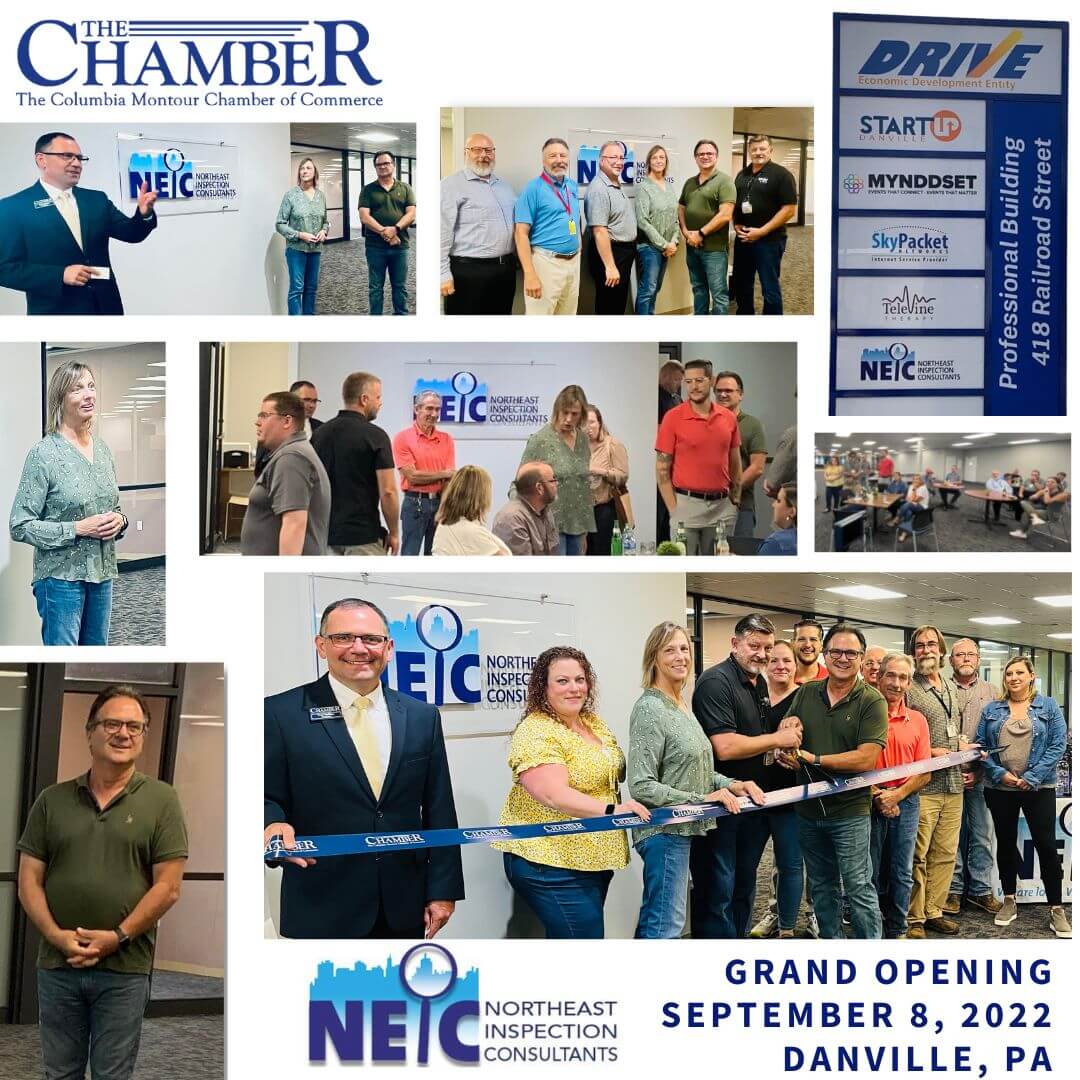
Read more about NEIC on their website.


